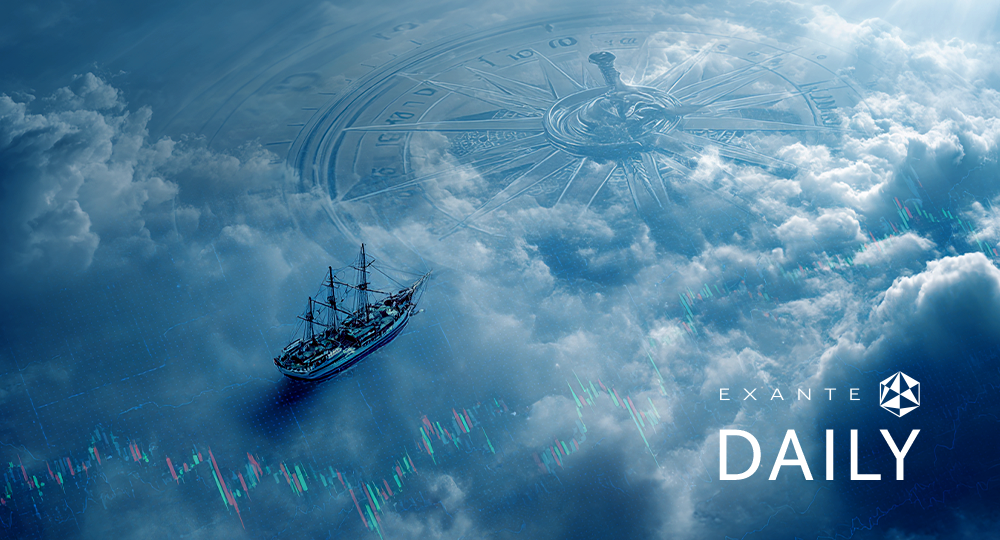
EXANTE Monthly Macro Insights

- La Fed se adelanta
- ¿El pellizco energético de Europa?
- El enigma de la deuda y la inflación del BCE
- Revelado el ganador del Premio EXANTEN

Índice VIX enero-julio de 2022. Fuente: Refinitiv
Los mercados en julio
Estados Unidos:
S&P 500 ↑ 7,6% en lo que va de mes y ↓ 14,6% en lo que va de año
Nasdaq 100 ↑ 10,5% en lo que va de mes y ↓ 20,1% en lo que va de año
Dow Jones Industrial Average ↑ 4,6% en lo que va de mes y ↓ 11,4% en lo que va de año
NYSE Composite ↑ 4,9% en lo que va de mes y ↓11,5% en lo que va de año
Europa:
Stoxx 600 ↑ 6,3% en lo que va de mes y ↓ 11,3% en lo que va de año
DAX ↑ 3,9% en lo que va de mes y ↓ 16,4% en lo que va de año
CAC 40 ↑ 7,0% en lo que va de mes y ↓ 11,4% en lo que va de año
FTSE 100 ↑ 2,5% en lo que va de mes y ↓ 0,5% en lo que va de año
IBEX35 ↓ 0,2% en lo que va de mes y ↓ 7,2% en lo que va de año
FTSE MIB ↑ 3,0% en lo que va de mes y ↓ 19,8% en lo que va de año
Mundial:
El índice MSCI World ↑ 4,3% en lo que va de mes y ↓ 17,5% en lo que va de año
Hang Seng ↓ 5,7% en lo que va de mes y ↓ 11,9% en lo que va de año
Nota: Datos del 28 de julio de 2022 a las 6:30 pm EST
La Fed sigue adelante. En una decisión unánime de los miembros del Comité Federal de Mercado Abierto (FOMC, por sus siglas en inglés), la Reserva Federal de Estados Unidos subió los tipos en 75 puntos básicos en su última reunión del pasado 27 de julio. El presidente de la Fed, Jerome Powell, dijo que la Reserva Federal podría subir los tipos de interés "de forma inusual" en el futuro, pero que todos los movimientos dependerían de los datos de cada reunión y que no habría más "orientación". Este insistió en que EE. UU. no está en recesión, ya que el mercado laboral sigue siendo fuerte. La Casa Blanca también se ha opuesto a los rumores de recesión en un intento de mantener a los votantes de cara a las elecciones de mitad de mandato del próximo 8 de noviembre. Los beneficios de las empresas, según los datos de Refinitiv, siguen aumentando, y los beneficios del segundo trimestre del S&P 500 parecen subir un 7,6% anual. No obstante, los mercados se centran en la caída del 0,9% del PIB registrada durante el segundo trimestre, tras el descenso del 1,6% visto en el primer trimestre del año, y muchos esperan ahora que la Reserva Federal suavice el nivel de subidas de tipos en un esfuerzo por lograr un aterrizaje más suave.
La inseguridad energética de Europa. Los países miembros de la UE se enfrentan a un creciente riesgo de recesión, ya que el bloque ha acordado recortar su consumo de gas natural en un 15% durante los próximos ocho meses, en un intento de reducir su dependencia de la energía proveniente de Rusia. Los precios del gas natural han experimentado un aumento de hasta un 14% y son, según datos de Bloomberg, más de 10 veces superiores al nivel habitual para esta época del año, ya que Rusia ha limitado el suministro de gas a través del Nord Stream 1 a solo el 20% de su capacidad máxima. Alemania, la mayor economía de la UE y la más dependiente de la energía rusa, está siendo presionada por España, Portugal, Italia y Grecia para que haga más por reequilibrar la interconectividad energética en toda Europa. Y, debido a que los precios del gas natural y la electricidad no dejan de subir, los gobiernos regionales se verán obligados a pagar más para subvencionar a los consumidores, lo que podría afectar a la dinámica de la deuda a largo plazo.
La eurozona está de capa caída. La inflación de la eurozona alcanzó el 8,6% el pasado mes de junio, lo que obligó al Banco Central Europeo (BCE) a actuar finalmente y a subir los tipos de interés por primera vez desde el año 2011. El banco subió su tipo de interés de referencia en 50 puntos básicos. La inflación se ha disparado hasta el 8,9% en julio, de nuevo impulsada por el aumento de los costes de la energía y los alimentos. El BCE se verá sometido a una presión cada vez mayor para que suba aún más los tipos, a pesar de los riesgos de recesión, y el miembro del Consejo de Gobierno Mārtiņš Kazāks ya ha instado a una subida "bastante significativa" en septiembre. Otros citarán la caída de los niveles de confianza de los consumidores, es decir, el indicador de sentimiento económico (Economic Sentiment Indicator, ESI) alcanzó su nivel más bajo en 17 meses, 99 en julio, frente a 103,5 en junio, y la caída de los PMI compuestos, 49,4 en julio, frente a 52 en junio, como razones para que el BCE reduzca el ritmo de las subidas de tipos. Sin embargo, al menos por ahora, la recesión se mantiene a raya, ya que el PIB de la zona euro registró un incremento intertrimestral del 0,7% en el periodo abril-junio y un 4,0% interanual, según las estimaciones de Eurostat, ya que Francia, Italia y España crecieron a pesar de que Alemania se estancó el mes pasado.
Una subida de tipos también plantea dudas sobre el nuevo Instrumento de Protección de la Transmisión (IPT) y cómo podría ser realmente un mecanismo eficaz cuando el BCE había sugerido que podrían ser necesarias nuevas subidas de tipos este año. También preocupa que la creciente inestabilidad política dentro de la eurozona, especialmente en Italia, donde el primer ministro Mario Draghi dimitió recientemente, haya empeorado las perspectivas de la eurozona.
Y el sobre, por favor… ¡Nos complace anunciar que el ganador del Premio EXANTEN es Jędrzej Walów, de Polonia! Tras una larga deliberación, los jueces han llegado a la conclusión de que el señor Walów ha proporcionado el mejor pronóstico y análisis económico y geopolítico en apoyo de ese pronóstico. ¡Enhorabuena a Jędrzej Walów!
Una vez más, pedimos disculpas por el retraso en el anuncio del ganador. Este se ha debido a que los jueces no estaban disponibles debido a la covid.
Acontecimientos clave en agosto
3 de agosto de 2022 - Reunión de la OPEP+. Los mercados estarán pendientes de si el grupo mantendrá la producción sin cambios para septiembre o si por el contrario considerará algún aumento de la misma.
4 de agosto de 2022 - Reunión de política monetaria del Banco de Inglaterra. Debido a que se espera que la inflación alcance el 11% en octubre, el Banco de Inglaterra (BoE) está presionado para subir los tipos. El gobernador del banco, Andrew Bailey, ha dicho que el BoE está barajando la posibilidad de hacer una subida de los tipos de interés de medio punto en agosto. Sin embargo, dado que la confianza de los consumidores se mantiene en un mínimo histórico de -41 y que el PMI de servicios del Reino Unido de S&P Global/CIPS cayó a 53,3 en julio desde 54,3 en junio, se espera que el crecimiento de la demanda se debilite todavía más durante los próximos meses, lo que significa que un nivel de subidas demasiado elevado podría acelerar los riesgos de recesión.
DESCARGO DE RESPONSABILIDAD: Aunque se han hecho todos los esfuerzos posibles para verificar la exactitud de esta información, EXT Ltd. (en adelante, "EXANTE") no se hace responsable de la confianza que cualquier persona pueda depositar en esta publicación o en cualquier información, opinión o conclusión contenida en ella. Las conclusiones y opiniones expresadas en esta publicación no reflejan necesariamente la opinión de EXANTE. Cualquier acción realizada sobre la base de la información contenida en esta publicación es estrictamente bajo su propio riesgo. EXANTE no se hará responsable de ninguna pérdida o daño relacionado con esta publicación.
Este artículo se presenta a modo informativo únicamente y no debe ser considerado una oferta ni solicitud de oferta para comprar ni vender inversión alguna ni los servicios relaciones a los que se pueda haber hecho referencia aquí. Operar con instrumentos financieros implica un riesgo significativo de pérdida y puede no ser adecuado para todos los inversores. Los resultados pasados no garantizan rendimientos futuros.
Regístrese para recibir perspectivas de los mercados
Regístrese
para recibir perspectivas
de los mercados
Suscríbase ahora



